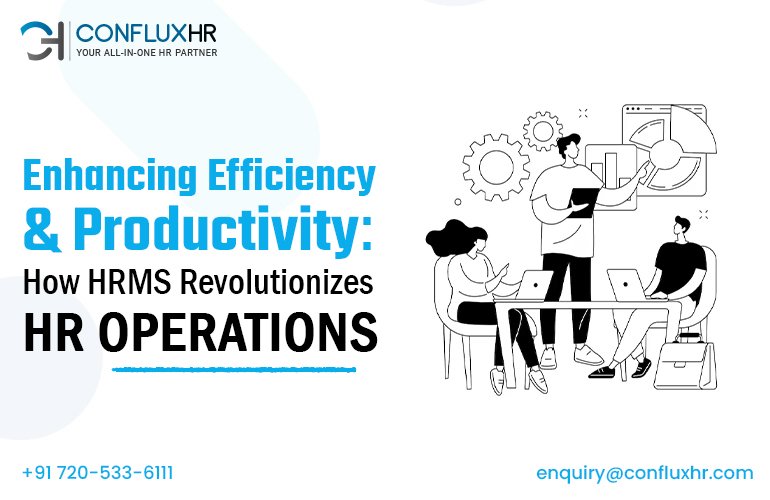Introduction
Efficiency and productivity are paramount in today’s fast-paced business environment. Harnessing the power of a robust Human Resource Management System (HRMS) is vital to achieving these goals.
This blog will explore how businesses can embrace efficiency and productivity by leveraging HRMS. We will examine the benefits of streamlining HR operations, automating tasks, empowering employees, and making data-driven decisions.
1.Streamline HR Operations: Simplify and Centralize Processes
A modern HRMS serves as a centralized platform to streamline HR operations. It consolidates various HR functions such as employee data management, leave management, attendance tracking, and performance evaluations. By streamlining these processes, HR teams can eliminate manual paperwork, reduce administrative overhead, and ensure consistent and efficient workflows. This streamlining enables HR professionals to focus on strategic initiatives and value-added tasks.
2.Automation: Save Time and Eliminate Errors
An HRMS automates repetitive and time-consuming HR tasks, resulting in significant time savings and improved accuracy. Routine processes like employee onboarding, leave approvals, and payroll calculations can be automated, reducing manual effort and the risk of errors. Automation also facilitates faster turnaround times, enhances employee experience, and empowers HR teams to handle larger volumes of work efficiently.
3.Employee Self-Service: Empower Employees and Boost Engagement
An HRMS often includes a self-service portal that empowers employees to access and manage their HR-related information. Employees can view and update personal details, access pay stubs, submit leave requests, and participate in performance management activities. By enabling self-service, HR teams can reduce administrative tasks, enhance data accuracy, and foster a culture of employee empowerment. This engagement leads to higher job satisfaction and increased productivity.
4.Data-Driven Decisions: Unlocking Insights for Strategic HR Management
One of the significant advantages of HRMS is the ability to generate comprehensive reports and analytics. With real-time access to HR data, organizations can derive valuable insights into employee performance, turnover rates, training needs, and workforce demographics. These insights enable data-driven decision-making, allowing HR professionals to develop effective strategies for talent acquisition, performance management, and employee development. By leveraging HRMS analytics, businesses can align HR initiatives with organizational goals, driving overall success.
5.Integration and Scalability: Seamless Collaboration and Growth
An advanced HRMS integrates with other business systems, such as payroll, accounting, and performance management tools. This integration eliminates data silos, ensures consistency, and enhances cross-functional collaboration. Additionally, an HRMS is scalable, accommodating the evolving needs of growing businesses. It can adapt to organizational changes, accommodate new hires, and expand functionalities as the company expands. This scalability allows businesses to optimize HR operations and support future growth.
Conclusion
Embracing efficiency and productivity with an HRMS is crucial for organizations seeking to stay ahead in today’s competitive landscape. Businesses can unlock their full potential by streamlining HR operations automating tasks, empowering employees, and making data-driven decisions. An HRMS enables streamlined processes, time savings, accuracy, and employee engagement. Embrace the power of an HRMS to optimize HR operations, drive efficiency, and pave the way for organizational success.


